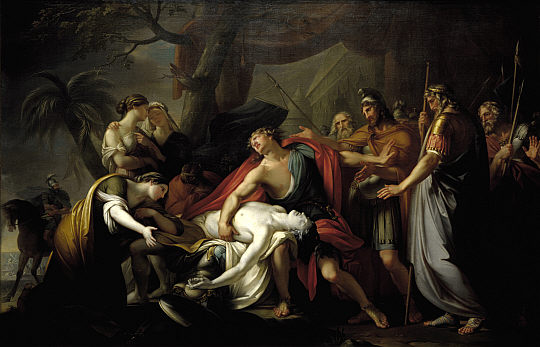Homer’s description of the moment Patroclus dies is exquisitely poignant, argues Christina Errico, and Homer’s unusually familiar treatment of Patroclus leads the listener to form an emotional connection with him. Homer, Iliad 16.843-863, discussed, translated, and read in Greek by Christina Errico.
You answered him feebly, horseman Patroclus:
“You boast loudly now, Hector, for Zeus the son of Cronus and Apollo gave the victory to you;
They overpowered me easily; for they themselves took the armor from my shoulders.
Even if twenty such as you met me,
they all would have been destroyed, overpowered by my spear.
But deadly fate and the son of Leto killed me,
and of men, Euphorbus; but you come third in line to strip off my armor.
But I will tell you another thing, and you take it to heart:
surely you yourself will not live long, but already
death and strong fate loom over you,
ready to beat you down by the hands of brilliant Achilles, son of Aeacus.”
And so, as he was speaking in this way, the end of death came over him;
his soul, having flown from his limbs, went to Hades
mourning his fate, leaving behind his manliness and youth.
τὸν δ’ ὀλιγοδρανέων προσέφης Πατρόκλεες ἱππεῦ:
ἤδη νῦν Ἕκτορ μεγάλ’ εὔχεο: σοὶ γὰρ ἔδωκε
νίκην Ζεὺς Κρονίδης καὶ Ἀπόλλων, οἵ με δάμασσαν 845
ῥηιδίως: αὐτοὶ γὰρ ἀπ’ ὤμων τεύχε’ ἕλοντο.
τοιοῦτοι δ’ εἴ πέρ μοι ἐείκοσιν ἀντεβόλησαν,
πάντές κ’ αὐτόθ’ ὄλοντο ἐμῷ ὑπὸ δουρὶ δαμέντες.
ἀλλά με μοῖρ’ ὀλοὴ καὶ Λητοῦς ἔκτανεν υἱός,
ἀνδρῶν δ’ Εὔφορβος: σὺ δέ με τρίτος ἐξεναρίζεις. 850
ἄλλο δέ τοι ἐρέω, σὺ δ’ ἐνὶ φρεσὶ βάλλεο σῇσιν:
οὔ θην οὐδ’ αὐτὸς δηρὸν βέῃ, ἀλλά τοι ἤδη
ἄγχι παρέστηκεν θάνατος καὶ μοῖρα κραταιὴ
χερσὶ δαμέντ’ Ἀχιλῆος ἀμύμονος Αἰακίδαο.
ὣς ἄρα μιν εἰπόντα τέλος θανάτοιο κάλυψε: 855
ψυχὴ δ’ ἐκ ῥεθέων πταμένη Ἄϊδος δὲ βεβήκει
ὃν πότμον γοόωσα λιποῦσ’ ἀνδροτῆτα καὶ ἥβην.
τὸν καὶ τεθνηῶτα προσηύδα φαίδιμος Ἕκτωρ:
Πατρόκλεις τί νύ μοι μαντεύεαι αἰπὺν ὄλεθρον;
τίς δ’ οἶδ’ εἴ κ’ Ἀχιλεὺς Θέτιδος πάϊς ἠϋκόμοιο 860
φθήῃ ἐμῷ ὑπὸ δουρὶ τυπεὶς ἀπὸ θυμὸν ὀλέσσαι;
ὣς ἄρα φωνήσας δόρυ χάλκεον ἐξ ὠτειλῆς
εἴρυσε λὰξ προσβάς, τὸν δ’ ὕπτιον ὦσ’ ἀπὸ δουρός.
Image: Gavin Hamilton, “Achilles Lamenting the Death of Patroclus,” 1760 – 1763. National Galleries Scotland

Leave a Reply